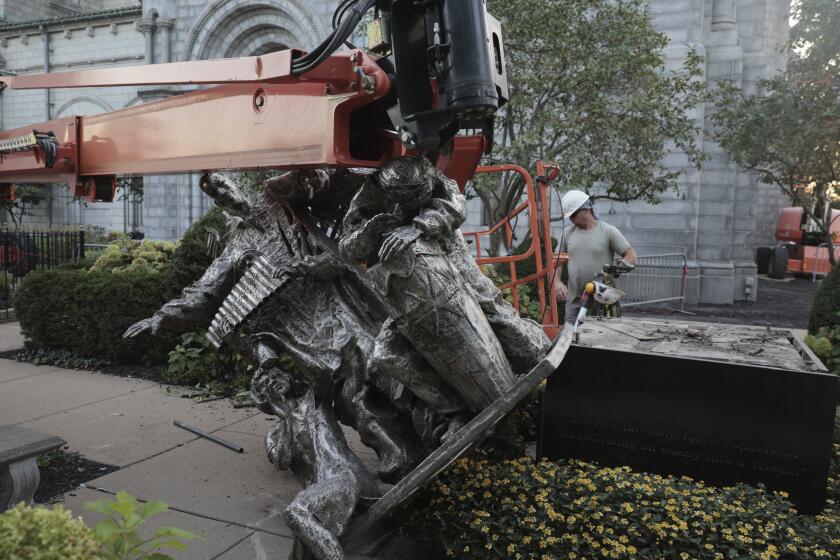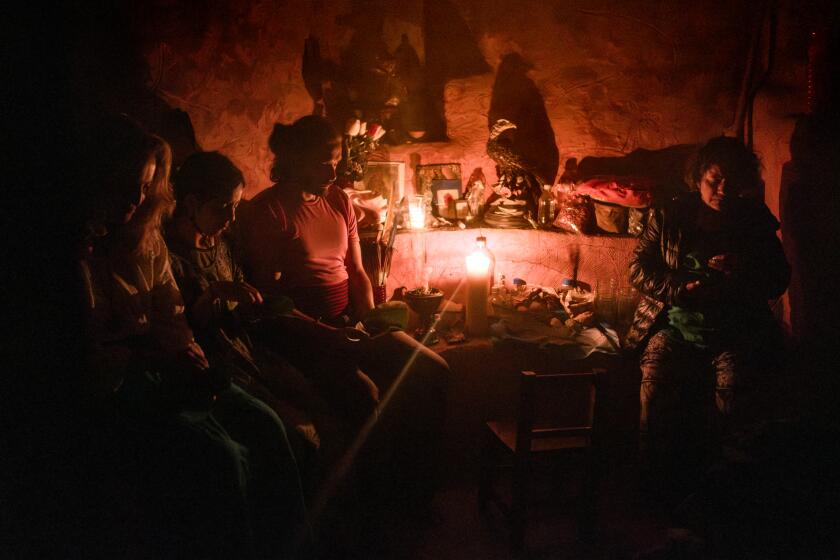Power-Sharing Deal Advances at Talks
Afghan leaders said Thursday that they were close to agreement on a transitional government for their country, with politicians of the dominant Northern Alliance reversing course and saying they could accept both foreign peacekeepers and the ousted king as the interim head of state.
Only 24 hours after deeming an international security force unnecessary and any return of the king premature, Younis Qanooni, the head of the Northern Alliance’s United Front delegation here, said he had been misunderstood and that his faction has no objections to either move.
“In principle, we have agreed on the formation of these two bodies,” the head of the exiled king’s delegation, Abdul Sattar Sirat, said of an interim Cabinet and parliamentary body for Afghanistan.
Diplomatic sources observing the behind-the-scenes bargaining here said the two main factions, the former king’s so-called Rome group and the United Front, had worked out a power-sharing formula broadly acceptable to the other two delegations.
Under the plan, the former king, Mohammad Zaher Shah, would serve as interim head of state and president of the parliamentary body, and political leaders acceptable to the United Front would occupy the lion’s share of seats in the transitional entities.
Early today, U.N. spokesman Ahmed Fawzi said that Haji Abdul Qadir, a Pushtun from the United Front, had left the talks.
Asked if his departure would disrupt the negotiations, Fawzi said, “I hope not.” He said the front has plenty of other delegates.
Seeing a ‘Tremendous Momentum’ for Peace
The power-sharing agreement appeared to reflect recognition by the negotiating parties that the people of Afghanistan are exhausted by nearly 23 years of bloodshed and are eager to receive the billions in reconstruction aid promised by an international community finally attending to their woes.
“We have something more important than military force. We have the support of the Afghan people,” Zaher Shah’s secretary, Zalmai Rassoul, replied when asked how the former monarch could exert influence over a country where guns have long been the means of persuasion. “The Afghan people are sick and tired of war. There is tremendous momentum in Afghanistan for peace. This majority force is with us.”
Diplomatic observers have worried since the talks began Tuesday in this spa town near Bonn that the delegates’ positions might diverge from those of the forces still fighting for territory and power in several regions of the country.
Qanooni, Afghanistan’s de facto interior minister, also appeared to recognize the aspirations for peace among the Afghan people with his apparent shift on international peacekeepers and the former king.
“Once there is a transitional authority for Afghanistan established, if that requires or necessitates an international peacekeeping force, we will go with that,” Qanooni told journalists, blaming bad translation for giving what he called the wrong impression a day earlier. A reporter who speaks the Dari language, however, said Qanooni had been correctly translated and had apparently “had his arm twisted with a ton of bricks.”
Qanooni also “clarified” his position on a transitional figurehead role for Zaher Shah.
“The former king is an important national and political figure in Afghanistan, and he can play an important role in ensuring unity and the political integrity of the country,” he said. On Wednesday, he had said the question of the king’s return could only be addressed at a council of tribal elders known as a loya jirga that is not expected to convene for about six months.
Promises to Reverse Bias Against Women
Qanooni’s about-face gave observers and organizers hope that the Northern Alliance is firmly committed to a redistribution of power rather than to trying to hold on to the vast territory it has acquired as Taliban fundamentalists retreat under intensive U.S. bombardment.
That division of power will be apportioned according to provincial ethnic balances, Sirat said. But he and other delegates who spoke to reporters about the emerging leadership bodies also vowed to ensure that women are adequately represented, reversing a decade of discrimination against what is now a 54% majority of the population because of so many years of war.
“I’m here to see that that happens,” chimed in Sima Wali, an outspoken advocate of Afghan women’s rights and a celebrated development aid activist.
Fawzi said the 38 delegates from the four Afghan factions “have been making headway” toward the two key objectives of the conference: the interim leadership and strengthened security so the transitional government can function.
The factions--the Northern Alliance’s United Front, Zaher Shah’s delegation and groups made up predominantly of Afghan exiles in Pakistan and Iran--have been exchanging lists of names for representation on the two transitional bodies and were down to the “fine-tuning,” Fawzi said.
Though Qanooni’s tone was much more agreeable and he declared himself “more optimistic” than a day earlier, diplomatic observers from some of the 18 nations watching the talks noted that much uncertainty remains about whether both objectives will be reached.
“It’s one of those situations where nothing is agreed until everything is agreed,” said James Dobbins, the U.S. special envoy to Afghanistan.
Northern Alliance officials had been urging the delegates to adjourn the talks here ahead of final agreements so the decisions could be made in the Afghan capital, Kabul. But Qanooni conceded that position too, saying that all factions see the need for expediency and want to resolve the leadership and security issues before departing the Rhine River retreat.
More to Read
Sign up for Essential California
The most important California stories and recommendations in your inbox every morning.
You may occasionally receive promotional content from the Los Angeles Times.











